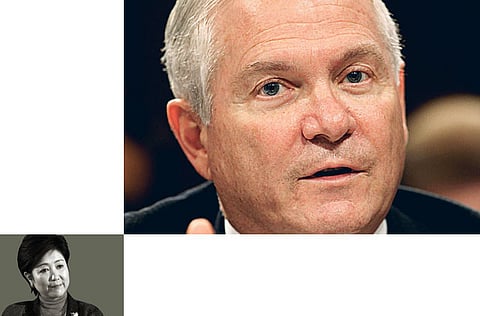Can Asia manage without America?
Yuriko Koike writes: Looming Afghan troop withdrawal puts the onus on US allies

July will mark two milestones in America's sometimes tortured relations with Asia. One is the beginning of the end of the nearly decade-long struggle in Afghanistan — the longest war in US history — as President Barack Obama announces the first troop withdrawals.
The other is the 40th anniversary of Henry Kissinger's secret mission to Beijing, a turning point in the Cold War and the first step on China's road to modernisation — but at the time a huge shock to Asia, particularly Japan.
The looming Afghan withdrawal recalls, at least for some Asians, a third, even more traumatic event: America's chaotic exit from Saigon in April 1975. Back then, that debacle seemed to presage a broader US withdrawal from Asia, with a war-weary American public seeking the supposed comforts of isolationism.
Today's Asian nervousness exists not only because isolationism appears to be gaining ground once more in America, but also because Afghanistan's stability remains in doubt, while China's power is rising in the absence of any pan-Asian consensus or institutional structure. America did, indeed, turn inward following the fall of Saigon, and its neglect of Afghanistan following the Soviet withdrawal in 1989 led to chaos and Al Qaida's near takeover of the country.
So it is not surprising that many Asian leaders are asking themselves what commitments the US will maintain once its troops leave Afghanistan. Perhaps, equally important, many people in Asia are also debating whether the region will be able to rebalance itself should the US scale back its military presence.
Reassurance
Fortunately, US Secretary of Defence Robert Gates has reassured America's Asian friends and allies that regional disengagement is not being contemplated. At the recent Shangri La Dialogue in Singapore — indeed, in the presence of Chinese Minister of Defence General Liang Guanglie — Gates outlined his ideas for continuing US cooperation in and with Asia.
Gates promised to increase the number of US warships deployed to Singapore as part of the US-Singapore Strategic Framework Agreement; increase the number of US Navy calls in Asian ports; hold more joint naval exercises; and improve multilateral military cooperation.
Even more reassuring were the principles that will, according to Gates, guide America's future Asian strategy: free and open commerce; sovereignty of Asia's states; open access to Asian and global sea lanes, airspace, and cyberspace; and peaceful resolution of all conflicts.
These principles matter because Australia, Japan, South Korea, Thailand, the Philippines, India, Indonesia, Singapore, Malaysia, New Zealand, Vietnam, and even Mongolia all regard America's military presence in the region as essential to counterbalancing China's increasing might.
Gates, however, is due to step down from his post shortly, which is unfortunate, because the Obama administration's apparent lack of any explicit Asia strategy means that Gates's reassurances might not reassure for very long.
Losing confidence
Nowadays, US policy on Asia needs the type of strategic vision and insight that guided Kissinger's discussions with Mao Zedong and Zhou En-lai four decades ago. Without a clear and convincing doctrine, at least some Asian leaders are likely to remain dubious of America's ability to remain Asia's dominant military force, particularly given its economic woes, projected fiscal retrenchment, and other overseas commitments.
Securing a structure of peace in Asia, however, is not solely America's responsibility. Japan's government in particular needs to identify a coherent Asia strategy and stick to it, instead of leaning towards China one minute, and America the next. In constructing a viable strategy, deepening Japan's partnerships with Asia's great democracies — India, Indonesia, and South Korea — must be a priority.
But the biggest question concerns China's place in a consensual Asian order, and its willingness to collaborate with its neighbours, as well as with the US, in creating it. The doubts that many Asians now hold about China's intentions are well grounded, given the secretive nature of China's military build-up, and its leaders' increasingly aggressive tone in territorial disputes with India, Japan, the Philippines and Vietnam.
China's unconditional support for North Korea's wayward regime, despite its repeated crimes against peace, is also a cause for concern about whether China will treat its neighbours' security concerns with respect.
What happens in Afghanistan as America begins to draw down its troops will test the willingness of all of Asia's powers to work together to build a secure regional order. Only a strong regional consensus on Afghanistan's future can avert the prospect of a renewed struggle for mastery there.
If such a consensus can be forged, however, it will provide a foundation for further collaboration in building a pan-Asian order based on consent, not military might.
— Project Syndicate, 2011
Yuriko Koike, Japan's former minister of defence and national security adviser, is chairman of the Executive Council of the Liberal Democratic Party.


